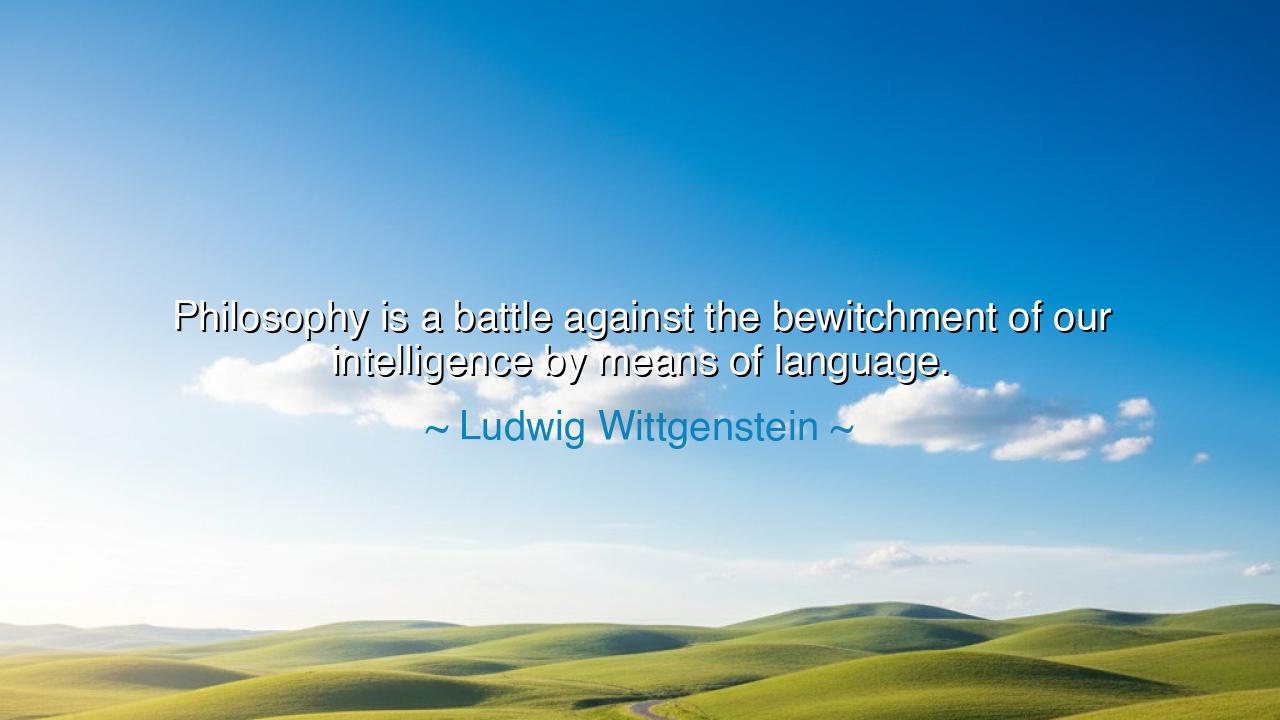
Philosophy is a battle against the bewitchment of our
Philosophy is a battle against the bewitchment of our intelligence by means of language.






“Philosophy is a battle against the bewitchment of our intelligence by means of language.” Thus spoke Ludwig Wittgenstein, the great philosopher of the twentieth century, whose words cut through the fog of illusion like a blade of light. In this single line, he unveiled the hidden struggle that all thinkers, all seekers of truth, must face — the struggle not against the world itself, but against the words by which we describe it. For it is not reality that most often deceives us, but the language through which we attempt to capture it. Words, when left unexamined, weave spells upon the mind. They charm us into confusion, entangle our thoughts, and make us mistake shadows for substance.
Wittgenstein knew well the bewitchment of intelligence that language can produce. In his earlier years, he sought to build a perfect logical structure for understanding — a language so precise that misunderstanding would be impossible. But as his thought deepened, he realized the futility of that dream. For language is not a fixed mirror of reality; it is a living thing, shaped by the habits, hopes, and errors of its speakers. The same word may wear a thousand faces depending on who speaks it, when, and why. Thus he came to see philosophy not as the creation of new theories, but as the clearing of linguistic confusion — the freeing of thought from the snares of its own symbols.
To say that philosophy is a battle is to admit that truth is not given, but earned through struggle. Our intelligence, he warns, can be enchanted — not by lies, but by our own eloquence. We use words like “mind,” “freedom,” “truth,” or “being,” and think we have grasped something real, when in fact we are only chasing reflections on water. The task of the philosopher, then, is to break the spell — to ask, “What do I mean when I say this?” and “What do others mean when they say the same?” Through such questioning, the fog begins to lift, and thought stands once more in the clear air of understanding.
History gives us many who have fallen prey to this bewitchment. Consider the age of medieval alchemy, when men spoke of essences and spirits in nature, believing that words could uncover the hidden soul of matter. They mistook the poetry of language for the laws of the world. Yet from their confusion arose science, when minds like that of Galileo began to demand that words match observation, that speech bow to reality. In every age, the same war must be fought — between the comfort of words and the discipline of truth. Wittgenstein, standing in this long tradition, was both a philosopher and a warrior of meaning.
His insight is not for scholars alone. Every human being, in daily life, is tempted by the bewitchment of language. We speak carelessly and are deceived by our own speech. We say “I’m fine” when we are breaking inside; we say “success” when we mean “approval”; we say “freedom” without knowing whether we seek liberation or indulgence. Words become veils, and soon we no longer see ourselves. But if we pause — if we listen to our own words as Wittgenstein urged — we may begin to uncover truth where confusion reigned. To speak rightly is to live rightly, for language is the mirror of the soul.
Thus, the lesson of Wittgenstein’s teaching is both intellectual and moral. Guard your mind against the spells of careless speech. Do not let words do your thinking for you. When you hear great promises or fearful claims — from leaders, from teachers, or even from your own heart — ask always: What do these words truly mean? For behind every illusion, every deception, there is a misuse of language. To learn to see through words is to awaken from the dream of false understanding.
In practice, this means cultivating clarity and humility. Speak less, but with precision. Seek to understand before you declare. When you encounter an argument, look not only at what is said, but at what is assumed. And when you struggle to express yourself, do not despair — for the struggle is the very heart of philosophy, the slow unbinding of thought from its chains.
So remember Wittgenstein’s immortal insight: language is both our greatest gift and our greatest danger. It can illuminate the truth, or it can imprison the mind. To study philosophy — or to live wisely — is to wage this constant battle for clarity. Therefore, let your words serve truth, not vanity. Speak to reveal, not to conceal. And in so doing, you shall become not merely a thinker, but a liberator of thought itself — one who walks, as Wittgenstein did, beyond the enchantment of language, into the bright realm of understanding.






AAdministratorAdministrator
Welcome, honored guests. Please leave a comment, we will respond soon